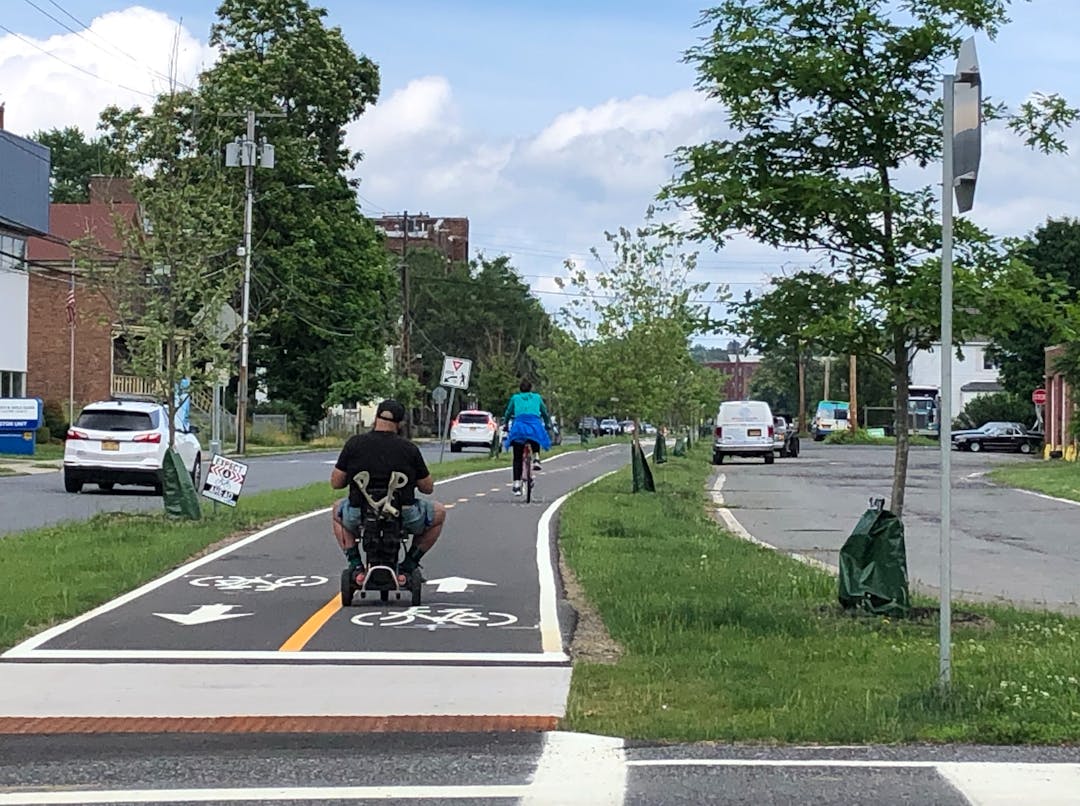Pedestrian and Bicycle Master Plan

Consultation has concluded.
Use el botón de traducir en la parte superior derecha para españolThe City of Kingston has drafted a Pedestrian and Bicycle Master Plan (PBMP) that will inform our efforts to improve conditions for active transportation users, reduce vehicle congestion and emissions, and support a culture of health across the community.
A Pedestrian and Bicycle Master Plan is an assessment of a city’s current infrastructure that supports safe and desirable biking and walking, as well as a roadmap for how it can improve for the future.
The Pedestrian and Bicycle Master Plan for the City of Kingston includes:
- an inventory and analysis of current road condition
- streetscape recommendations and toolkit
- programmatic and education suggestions
- funding sources for implementation
- 25 maps and many appendixes
Download the adopted Kingston Pedestrian and Bicycle Master Plan Here (10mg file). Sections of the plan are in the column to the right. In addition, you can view interactive sidewalk and curb ramp data in the Ulster County Dashboard here. To change the view, select the top right box and select Kingston.
Why a Pedestrian and Bicycle Master Plan?
Active transportation includes non-motorized means of travel such as walking and biking. An ideal active transportation network has well-connected streets and dedicated paths that are linked to local transit (e.g., bus, rail, and ferry). Making these routes safe and convenient for all types of travel can promote physical activity, recreation, and environmental preservation — and help reduce negative health impacts.
With a traditional road network that is laid out in a grid-like pattern across 8.8 square miles and a population of 24,000, Kingston is an ideal setting that lends itself to more walking and biking. Historically, city infrastructure made traveling without a car much easier. However, as many cities across the country experienced, much of this infrastructure radically changed during the mid-20th century with the rise of the automobile. Recently there has been is an active transportation (walking & biking) renaissance happening in Kingston, NY. For the past 10 years, a passionate community has envisioned and has built around 15 miles of a trail network called the Kingston Greenline (https://kingstongreenline.org). The development of this plan is a natural extension from these developments.
What has been done to create the Pedestrian and Bicycle Master Plan?
In December 2019, the City was awarded a $60,000 NYSDEC grant to undertake this important initiative with a $60,000 match in staff time provided by the City. Then in August 2021, the City went into contract with Barton & Loguidice, D.P.C., who has worked with community members and City staff to conduct research and develop the plan. A Project Advisory Committee, or PAC, was created to help guide the project. A draft document was presented in March 2023, feedback was incorporated and a final draft was published in July 2023. The final draft was presented to the Common Council in November and was adopted in January 2024.
Project Timeline
| October 4, 2021 | Project Kick-off | Convened City and Consultant Team and officially kick off the project |
| October 13-14, 2021 | PAC Meeting #1 | Convened PAC and introduce/initiate the project |
| January 4, 2022 | PAC Meeting #2 | Conducted walking and biking tour of Kingston to observe existing conditions |
| January 18, 2022 | Public Meeting #1 | Introduced project to public and solicit input on Kingston’s needs and priorities related to walking and biking |
| March 15, 2022 | PAC Meeting #3 | Reviewed existing conditions inventory |
| April 2022 - Feb 2023 | Plan Development | Plan Developed with feedback from City Staff |
| March 1st, 2023 | PAC Meeting #4 | Reviewed draft PBMP |
| March 1st, 2023 | Complete Streets Training | Public presentation about streets being engineered for all users. |
| March 21st, 2023 | Public Meeting #2 | Presenting draft PBMP |
| April 14th, 2023 | Comments Due | All feedback was incorporated into the draft. |
| July 10th, 2023 | Final Draft Available | The revised final draft was posted to this webpage. |
| November 15, 2023 | Plan Presented to Common Council | The final draft was presented to the Common Council for consideration. |
| January 10, 2024 | Plan Adopted | The Common Council adopted the plan as an official guidance document for the City. |
Public Outreach
Soliciting and interpreting public input was an integral component of this PBMP. Despite the fact that the COVID-19 pandemic limited opportunities for public outreach, especially at indoor events during cold weather months, the use of online tools and other innovative outreach methods still allowed for a robust public engagement strategy. Several opportunities were offered to the community to participate throughout the development of this PBMP, including a community survey, a crowdsourcing map, and two public information Meetings. The Community Survey was available online from October 2021 to May 2022. Hard copy versions in English and Spanish were also available in multiple community locations, including the Kingston Library, Rough Draft, People’s Place, Samadhi, and two houses of worship. The Crowdsourcing Map was available online from November 2021 to May 2022. The survey had 217 responses and the crowdsourcing map had 292 comments.
In order to inform the community about this project and to encourage public participation, multiple forms of community outreach were implemented. First, the input tools were advertised at the Kingston Farmer’s Market, the YMCA Farm Project Harvest Festival, The Tour de Kingston, a Rondout Garden event, Kingston Uptown Snowflake Festival, the YWCA’s Spring Well event, and a YMCA bicycle repair event.
On February 11th, 2022 and for the following two weeks, Facebook advertisements were placed for people of all ages and genders within a three-mile radius of the City. These advertisements reached 5,346 people. The City’s Spanish-speaking Clerk was listed in Spanish on the outreach materials, and she was available to assist users with the Crowdsourcing Map. In addition, the consultant team facilitated a Complete Streets Training on March 1st, 2023 to review the basic principles of Complete Streets and active transportation as a foundation for the PBMP.
Draft Plan
After much work, a draft plan was presented for feedback. A public meeting was held March 13th, 6pm, at City Hall, top floor, 420 Broadway. Spanish interpretation was available. The presentation highlighted the major sections of the draft plan. Feedback was requested from the community. Comments were accepted until April 14th, 2023. All submissions were reviewed and added to the appendix of the Plan. The Plan was submitted to the Common Council for consideration in the Fall of 2023.
Final Plan and Next Steps
The Kingston Pedestrian and Bicycle master Plan was adopted by the Common Council on January 10th, 2024. Recommendations from the Plan have already begun being implemented. The City did the "Be A Road Hero" transportation education campaign in 2023. Transportation education programing is being planned. A wayfinding plan for the Kingston Greenline is in development. The City used recommendations in the PBMP for for Transportation Alternatives Program and Safe Routes for All grant applications. The City was successful in it's application for an Urban Forest manger and additional street trees support is underway. The Complete Streets Advisory Council is developing recommendations for sidewalk funding. A bicycle rack pilot program is underway and no-for-profits and businesses can apply for a rack with the form below. Pedestrian and bicycle counts are conducted twice a year. Volunteers are always needed - email Emily to sign up! Public feedback about transportation priorities and issues is being filed for future consideration.
Please visit our FAQs and Useful Links tabs to the right to learn more about active transportation and related topics. Email Emily Flynn at Kingston-ny.gov with any questions.
This project has been funded in part by the Climate Smart Community Grant Program, Title 15 of the Environmental Protection Fund through the New York State Department of Environmental Conservation. Additional funding has been provided by the Creating Healthy Schools and Communities grant program from the NYS Department of Health.



 Locations must be a business or not-for-profit within the City of Kingston and able to accommodate a 24in x 35in x 6in bicycle rack without restricting Americans with Disabilities Act (ADA) access to the sidewalk. The minimum space for installation is 4ft x 7ft.
Locations must be a business or not-for-profit within the City of Kingston and able to accommodate a 24in x 35in x 6in bicycle rack without restricting Americans with Disabilities Act (ADA) access to the sidewalk. The minimum space for installation is 4ft x 7ft. 




